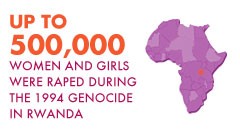
May 9, 2012 | Violence Against Women, War and Peace
At summit, sexual assault survivors share trauma, seek change / Stars and Stripes
By JENNIFER HLAD
Stars and Stripes
Published: May 8, 2012
WASHINGTON — Ayana Powell was still in Army training when she went to a party with her fellow soldiers and drank a cup of what she thought was juice. The next thing she remembers is waking up naked.
Powell knew she had been raped, but when she returned to training she said she was immediately yelled at for being 15 minutes late and arriving without a battle buddy.
When she finally reported the rape, she was told no one wanted to hear it. She was pregnant and was told that the Army would not pay for an abortion. Two weeks later, she was processed out of the military. Nine months later she had a baby.
“I had no connection. ... I had no connection to my daughter for three years,” Powell said Tuesday morning, crying as she talked about her experience. “You don’t know what to do. At some point, she’s going to ask questions, and I don’t know how to answer those questions.”
Powell was one of about 200 survivors of military sexual harassment, sexual assault and rape who gathered at a hotel on Capitol Hill on Tuesday morning seeking answers and seeking change as part of the first Service Women’s Action Network summit on military sexual violence.
The summit was frequently emotional, as survivors shared their stories and reacted to information from panelists.
Retired Brig. Gen. Thomas Cuthbert sparked unintended laughter from the attendees when he said the Uniform Code of Military Justice “works pretty well.” But when he said some young military women who were harassed and sexually assaulted at Aberdeen Proving Ground, Md., in the mid-1990s had not been taught how to say no to their superiors or how to protect themselves, the attendees began shouting and pretending to cough.
Comments from other panelists drew more positive response — such as when Michael Wishnie, a Yale law professor and founder of the Veterans Legal Services Clinic, questioned the logic of making victims of sexual trauma provide extensive evidence and details of the assaults in order to claim VA benefits.
“I don’t see why people should have to be re-traumatized to get the benefits they’ve earned,” Wishnie said.
As part of the summit, SWAN honored four members of Congress for their efforts on behalf of survivors of military sexual assault. Rep. Niki Tsongas, D-Mass.; Rep. Michael Turner, R-Ohio; Sen. Susan Collins, R-Maine; and Sen. John Kerry, D-Mass., each received the Lauterbach Award for Truth and Justice. The award is named in honor of Lance Cpl. Maria Lauterbach, who was eight-months pregnant when she was killed. Cpl. Cesar Laurean, a fellow Marine whom she’d accused of rape, was later convicted of first-degree murder.
Lauterbach’s mother, Mary Lauterbach, said she “never dreamed [the Marine Corps] would tolerate a rapist in the ranks” when she told her daughter to report the crime.
“They simply didn’t believe her,” Mary Lauterbach told the attendees, noting that Marines were still calling Laurean a “stellar Marine” a few days after Lauterbach’s body was found burned and buried in Laurean’s backyard.
“Rape is the one crime in which the victim has to prove they’re innocent,” Lauterbach said.
Lauterbach also spoke Tuesday morning at the Army’s Sexual Harassment/Assault Response and Prevention conference in Leesburg, Va.
On Monday, Maj. Gen. Mary Kay Hertog, the director of the Department of Defense’s Sexual Assault and Prevention Office, told Army leaders at that conference that commanders should hold their subordinate commanders accountable.
“If they’re not taking it seriously, they should have their asses relieved of command,” Hertog said in response to a question about commanders not taking the issue seriously.
Secretary of the Army John McHugh called sexual assault in the Army a “scourge.”
“There’s nothing more contrary to the values of being a soldier or a civilian in our Army than sexually assaulting another human being,” McHugh said.
But not all the news is bad, McHugh said. The Army is committed to achieving a top-to-bottom cultural change, and has already trained special investigators, lawyers and victim advocates to help those who report sexual assaults.
“The battle is far from over,” McHugh said, “[but] I know we will prevail. … Our soldiers deserve nothing less than an Army that lives up to its own core values.”
Article originally from Stars and Stripes.